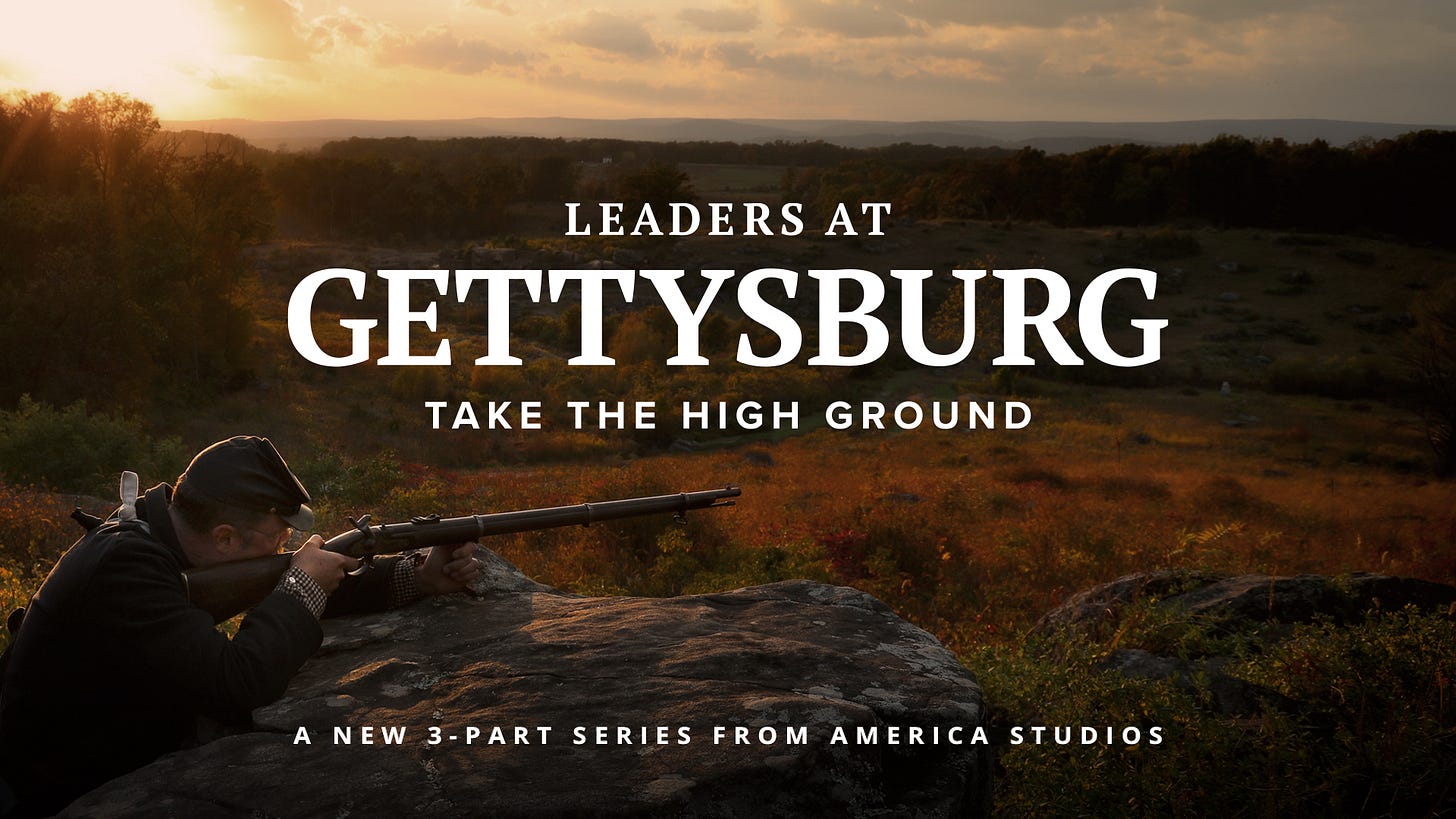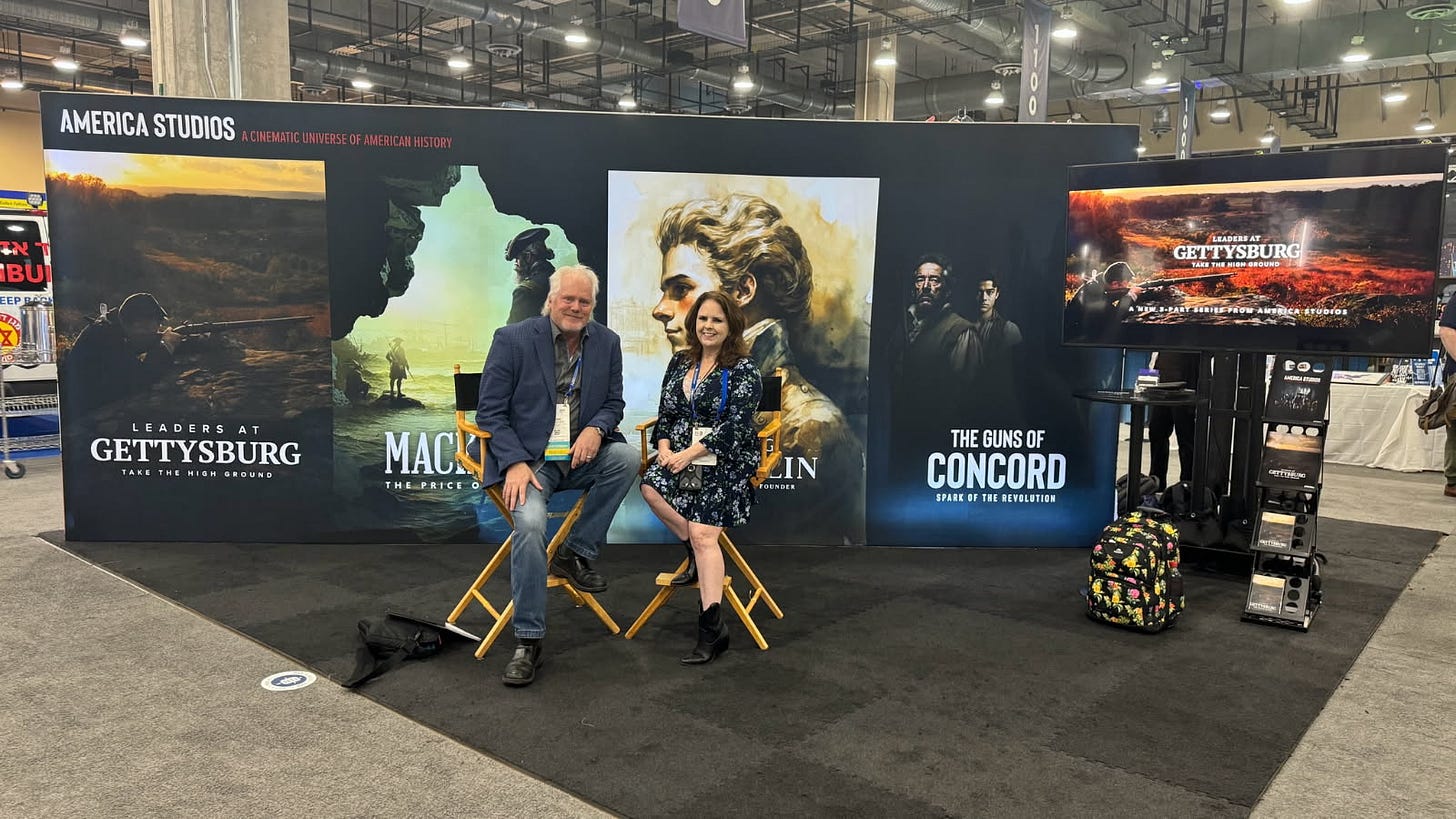Watch: Leaders at Gettysburg
America Studios has released an inspiring three-part series on leadership, a must-watch
I am excited to share with you a new film series from award-winning filmmakers John and Judy Grooters of America Studios. Leaders at Gettysburg: Take the High Ground brings history to life in a relevant and meaningful way through the lens of leadership.
This three-part series, which is led by professor, author and battlefield lecturer Jay Lorenzen, shows leadership lessons from the men who fought at the Battle of Gettysburg and applies these lessons to today through interviews with NFL quarterback Kirk Cousins, Don Cousins and others. You can watch the series by downloading the America Studios app from your Google or Apple play-store. The first episode is free.
My top three favorite aspects of this series are the leadership quotes, the metaphor of high ground, and Lincoln’s leadership perspective through his Gettysburg Address.
Favorite Quotes
While there are several inspirational quotes throughout the film, one of my favorites is this one:
“Leaders don’t inflict pain, they share pain.” Max Dupree
I like this quote because it paints leaders as having a stake in the game, to share in the burden of those they lead. NFL quarterback Kirk Cousins explains that leaders must show care for their followers.
“From day one when we draft a player to our team, I want them to know that I'm in their corner and that I want to see them have success for their sake, not my sake,” Cousins said.
Leaders at Gettysburg’s opening definition is also a favorite because it describes leadership as both a skill and an art.
“Leadership - the art and skill of influencing others toward an intentional outcome,” narrator John Grooters explains at the start of the first episode.
Higher Ground Metaphor
Another favorite aspect of Leaders at Gettysburg is the metaphor of higher ground. The intentional outcome at Gettysburg July 1-3, 1863, was to win the battle, which included 160,000 men fighting for the Union and the Confederacy. With 51,000 casualties, the Battle Gettysburg proved the bloodiest three days in the Civil War.
The leadership concept that most intrigued me was the idea of taking and holding the high ground.
This idea is introduced through the story of U.S. Army Calvary officer John Buford. Before the battle started, Buford went to the area’s highest point, the Lutheran Seminary cupola. From there he could see the big picture. As he surveyed the region and its roads, he identified the locations of high ground. This type of vision is called foresight, which is a necessary ingredient to lead people to a preferable future.
Gettysburg Address
I also appreciated Jay Lorenzen’s take on Lincoln’s Gettysburg Address, which took place several months after the battle on November 19, 1863 at the cemetery’s dedication.
“We can learn a lot about the language of leadership from Abraham Lincoln. Abraham Lincoln recognized at that moment he had a unique opportunity to help move the country from what is to what could be,” Jay Lorenzen explained about Lincoln's Gettysburg Address.
As is common with presidential leadership, Lincoln recognized that the language of leadership often gives the leader the opportunity to call people to deeper values, ones that transcend time.
Lincoln used the opening lines of his Gettysburg Address to do just that.
“Four score and seven years ago our fathers brought forth on this continent a new nation, conceived in liberty, and dedicated to the proposition that all men are created equal,” Abraham Lincoln.
Four score and seven years was the span of 87 years. What had happened 87 years earlier? Was it George Washington’s presidency? The ratification of the U.S. Constitution? The Bill of Rights?
No. Lincoln’s four score and seven years linked Americans in 1863 back to the Declaration of Independence on July 4, 1776. He expressed the deep value that all men are created equal and endowed with inalienable rights of life, liberty and the pursuit of happiness.
The main reason this resonates with me today is that the more I have researched America's Revolutionary War, the clearer it is to me that the end of the American Revolution in 1783 was the beginning of the abolishment of slavery.
Inspired by the Declaration of Independence and also quoting it, several slaves sued and won their freedom when a judge declared slavery unconstitutional in Massachusetts according to the state’s constitution in 1783. Abolition societies began to pop up in the northeastern states.
And so, over time, America became a divided country with slave and free states. The great tragedy, of course, is that it took the Civil War to complete what was started in the American Revolution. Lincoln tapped the powerful deep meaning of the Declaration of Independence at Gettysburg to lead people, especially freed slaves, to a new birth of freedom.
I encourage you to watch Leaders at Gettysburg. You’ll be inspired by its stories, quotes, metaphors and the profound sacrifice made for freedom. It’s available by downloading the America Studios app from your Google or Apple play store. The first episode is free. Enjoy!




